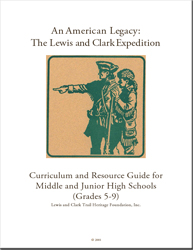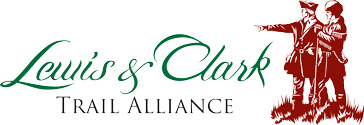Corps of Discovery Curriculum Guide

Twenty-five years ago, the Lewis and Clark Trail Heritage Foundation (LCTA) developed a cross-curricula guide for middle school educators. Our goal was to create an easy-to-use curriculum guide that was both historically accurate and culturally respectful. Today, we offer educators an updated version of that curriculum guide, with new lesson plans and resources, new student activities for learners of all ages, and a stronger multicultural perspective.
The American Legacy: The Lewis and Clark Expedition

Curriculum and Resource Guide for Middle and Junior High Schools grades 5–9 by the Lewis and Clark Trail Heritage Foundation, 2001.
The Corps of Volunteers for North Western Discovery created an American legacy. The success of this group of people history now calls the Lewis and Clark expedition, helped fulfill one of President Thomas Jefferson’s dreams for the United States and added to the nation’s continuing quest for more knowledge. It is important for all Americans to understand the place the Corps of Discovery has in our history. With the approach of the bicentennial commemoration of the expedition in 2003-2006, we must be careful not to make “saints” of the expedition members, especially the very competent co-leaders, Captains Meriwether Lewis and William Clark. The members of the expedition were real people with real joys, real problems, real mistakes and real accomplishments. It is this human aspect of the Corps of Discovery which makes it important for America’s youth to study and learn about the Lewis and Clark expedition.
Oceti Sakowin (Sioux) / South Dakota Department of Education
- Oceti Sakowin Essential Understandings: Instruction Resources (PDF)
- The Oceti Sakowin Essential Understandings and Standards (OSEUS) Online Training Course (YouTube)
Kids’ Corner
Our collection of Lewis and Clark learning activities and resources for inquisitive youths of all ages.
Discover Lewis & Clark
Discover Lewis & Clark: Our comprehensive, in-depth website on all things Lewis and Clark.
DocsTeach
Sponsored by the National Archives and National Archives Foundation, DocsTeach provides access to thousands of primary sources for teachers, students, and history explorers. Of interest to Lewis and Clark historians:
- Home page: https://www.docsteach.org/
- Analyzing a Map of the Louisiana Purchase
- Lewis and Clark’s Expedition to the Complex West
Honoring Tribal Legacies
Honoring Tribal Legacies is an active collection of digital teaching resources that germinated during the Lewis and Clark Bicentennial, and currently sponsored by the National Park Service, University of Oregon, and the Lewis and Clark National Historic Trail. Resources include:
More Tribal Education Resources
- Smithsonian National Museum of the American Indian: Native Knowledge 360º
- Putting Montana Students First, Indian Education in Montana
- Since Time Immemorial: Tribal Sovereignty in Washington State
- Oregon American Indian, Alaska Native, and Hawaiian Native Education
- Teaching of Our Elders, North Dakota Native American Essential Understandings Project
Lewis and Clark National Historic Trail, U.S. National Park Service
- Color the Trail: Animals features the Trail’s creatures with their names in Chinuk Wawa, Lakota, Arikara, Shoshoni, Osage, Hidatsa, Blackfoot, Nimipuutimt, and Mandan.
- Color the Trail: Birds describes species in the Journals of Lewis and Clark.
- Virtual Learning Series—Fridays with a Ranger. Virtual tours every friday at YouTube.
- Explore all 4,900 miles of the Lewis and Clark National Historic Trail from your living room at: https://www.nps.gov/lecl/index.htm. You’ll find amazing interactive maps linking sites along the Trail’s 4,900 miles from Pittsburgh all the way to the Pacific Ocean!
- Virtual Passport Stamp: Hidden somewhere on our Lewis and Clark National Historic Trail website is their new virtual visitor stamp. Click around.
- Virtual Trail Trip with the Lewis and Clark Pups: Relive the 2018 Lewis and Clark National Historic Trail and International Space Station journey of the Lewis and Clark Pups by visiting the Newfie News Blog.
- Junior Ranger Program: Lewis and Clark National Historic Trail
Frontier Army Museum
- The Lewis and Clark Expedition, Through Their Dog Seaman’s Eyes
- Lewis and Clark Activity Book
- Army Explorers of the 19th Century, Kansas Teacher’s Curriculum
Sacajawea Interpretive, Cultural and Educational Center
The center’s “Links to Learn” page includes:
- Sacajawea Center Activity Booklet
- Short Biography of Sacajawea
- Seaman, Lewis’ Newfoundland Dog
More
Huntington Library Grade 5 Curriculum: “The Corps of Discovery: The Lewis and Clark Expedition” (pdf)
